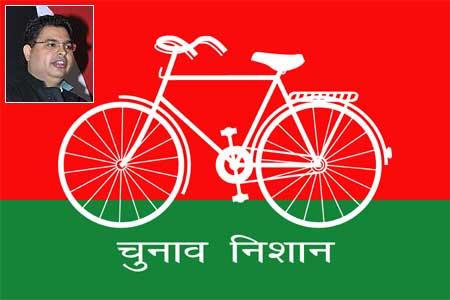
India needs well-educated and competent politicians, Abhishek Mishra, who resigned from his job as a professor at IIM-Ahmedabad to join the Samajwadi Party to successfully fight the assembly elections, tells Faisal Kidwai
"The broad stroke, or the broad brush, will not change just because one Abhishek Mishra enters politics. But somebody who starts painting everybody with the same brush will be alert and say there are some examples of hard-working and honest people who are entering politics... for instance there is Abhishek Mishra," says the former IIM professor and newly minted minister.
Mishra says the party will investigate all corruption charges against the Mayawati government, but there will be no vengeance.
Post the Samajwadi Party's massive victory in the assembly elections, Mishra has been appointed minister of state for protocol; the department itself remains with Chief Minister Akhilesh Yadav. Excerpts from a recently conducted interview in which Mishra shares his dreams for the nation with Faisal Kidwai:
Why did you decide to join politics?
In a democratic set-up, the legislature is the most important part of democracy. This is where all the laws, which are then implemented by the bureaucracy and the judiciary, are framed.
So it's important that well-educated, competent and knowledgeable people reach the legislature. If you look at any developed country, their level of development is directly co-related to the level of education or the professional accomplishment of their legislatures.
I had a deep, innate desire that a new breed of honest and educated people, people with vision, people who have global exposure, should enter politics.
I remember sitting in Ahmedabad and discussing that good people must enter politics. I finally said that if there is something one wants in life, then one has to be willing to pay the price. I have paid that price to be here today. I have sacrificed.
I resigned my job and started working on this. God has been very kind and I'm here.
Click on NEXT to read more...
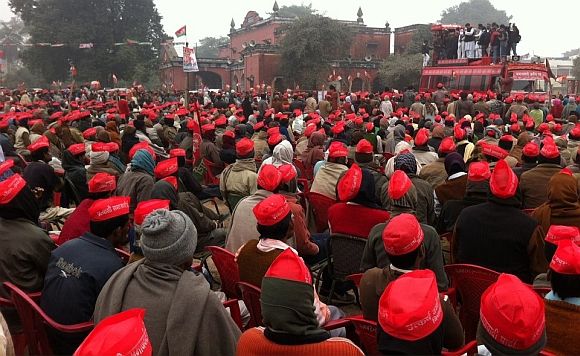
There are many who say that all politicians are corrupt and are in politics just for money and power. Don't you think people will start assuming that about you, too?
The broad stroke, or the broad brush, will not change just because one Abhishek Mishra enters politics. But somebody who starts painting everybody with the same brush will be alert and say there are some examples of hard-working and honest people who are entering politics... for instance there is Abhishek Mishra.
Laws start changing with exceptions, then exceptions grow in numbers and then that exception becomes a norm and that becomes the law.
Then your joining politics can motivate others?
Yes, of course. People will get motivated and enter politics. When I had first decided to join politics, I had thought that if I'm able to achieve this then I'd be able to set an example and say to others, 'Pay the price and go ahead and do it yourself'.
Recently, two people, who were inspired by my move, had come to Lucknow from IIM-Bangalore and were asking me how they can contribute to the country by joining politics.
During the campaign, students from IIM-Ahmedabad would fly down on weekends and campaign for me in my constituency. They could not skip work, so they would come down late in the evening on Friday and take the early morning Monday flight back to Ahmedabad. They went from door-to-door in the narrowest alleys and worked there and understood the democratic set-up. Now, they are so excited that they want to come and work for the public good.
...
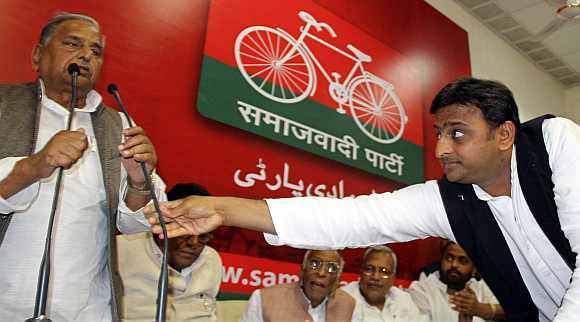
But why the Samajwadi Party and not any other political group?
Which party is better than the SP, you tell me. I have been a professor of strategy and innovation. As a result of my training, my education, my teaching and my consulting, there is one thing I understand -- no organisation thrives without clear leadership.
The SP is the only party in Uttar Pradesh that has a defined and established leadership which is popular with the people. We have an experienced leader in the shape of Netaji (party supremo Mulayam Singh Yadav), who has seen the evolution of democracy in this country. We have a leader (current Chief Minister Akhilesh Yadav) who is young, who is rearing to prove a point, who is passionate about development in the country and who understands the state.
I thought this combination of experience and youthful energy was a good leadership combination and this is what will push the SP to prominence. My theory on leadership has come true in a year's time.
That's the reason I joined the SP.
Nobody predicted, or expected, such a sweeping victory for the SP. Were you surprised by the results?
I strongly disagree. In our internal meetings, we were talking of 200-215 seats. We were sure that we were getting at least three seats in every district.
This is what I had said on television as well. And we actually got 225 seats.
...
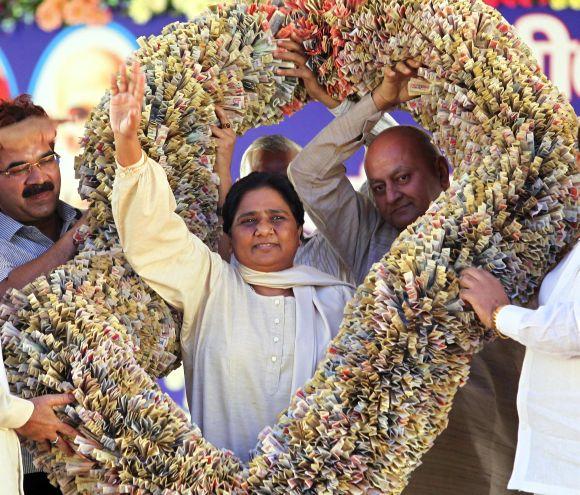
What was the reason for your party's success?
There were two or three things.
First, there was absolute anger against the Mayawati government. People were fed up; they were shocked and could not believe the level of corruption that was there in that government.
People had started saying 'Dalit ki beti nahin, daulat ki beti hai (She [Mayawati] is not a daughter of a Dalit, but a daughter of wealth).'
Secondly, people wanted a progressive, young face. Akhileshji emerged as a strong alternative. We were able to successfully pitch ourselves and say we are an alternative to the BSP. What benefited us, why people believed us and not others, was the fact that, for the past five years, we were struggling on the road with the people every single day.
We were holding protests, we were marching on the streets, we were opposing policies... That's why the people believed us and said to themselves, 'They have been here for five years, they are the only people visible and they will be a good alternative. Others fly in and fly out, so they won't be good alternatives.'
Do you plan to investigate the corruption allegations against the previous government?
The party will probe all charges, even if they are against our own ministers or party workers. The question is not against A, B or C. The party will be open to all sorts of inquiries and all sorts of actions against anybody who is found guilty in the previous regime, or even in the current regime.
At the same time, I must add that the SP has made it absolutely clear right -- from the very top leadership to Akhileshji -- that we do not want vengeance. We will not work against anybody and we don't want to come into power by saying that we will send these people to prison, as Mayawatiji had said.
By the way, what happened to her prison threat? Her government came and went and we are still here.
We don't want to trouble people. We want to give a neat, clean and progressive government in UP because we realise what can happen to a majority government. A party that had 200-plus seats failed to win even 80 seats. We have seen this, so we will work on progressive lines. We will focus our energies on development and positivity and stay away from negativity.
...
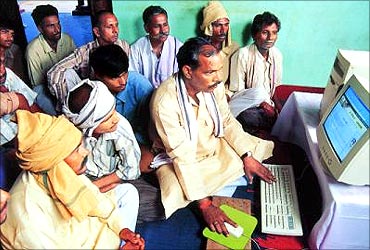
What are your and your party's main goals?
Goals have been very clearly highlighted by the national and state presidents. We want to work for the progressive development of the state. We want to invest in education and focus on employment opportunities. People who are unable to get jobs will be provided unemployment benefits.
We will try to bridge the digital divide by providing free laptops and tablets, so that people get familiar with technology and get educated. I believe that the digital divide should not be a deterrent to anybody's progress.
Another priority area is law and order.
The power sector is important simply because the per capita consumption of power needs to increase. The more people consume power, the better development of the state.
Do you think other leaders in the party, especially the senior ones, will be open to your progressive ideas?
We have a chief minister who understands every single bit of it and he has projected these ideas. You know, when the chief minister wants something done, it gets done. Nobody stands in the way of the CM.
...

Mayawati has claimed that the SP won because Muslims voted for the party as one bloc, while she was able to retain the Dalit vote. What's your reading?
The answer is obvious. Everybody voted for us and that's why we got this absolute majority. Had only one segment voted for us, we would have never reached this number.
Mayawati's own cadre, about whom she was so confident, did not vote for her. Their so-called vote base did not vote for them.
We have to start understanding that people will not vote for anybody anymore on the lines of caste and religion. They will vote for you as long as you do their work, because everybody needs employment, everybody needs development, everybody wants education and health.
Nobody gets anything by having a CM of your caste or religion. If the CM is asking for money on every single thing, why would anybody go and vote for that?
Are you saying that people have matured and are voting smartly?
Voters have matured big time. They have started to give preference to development as an agenda, growth as an agenda, economic opportunity and economic access as an agenda. That's a great and welcome change.